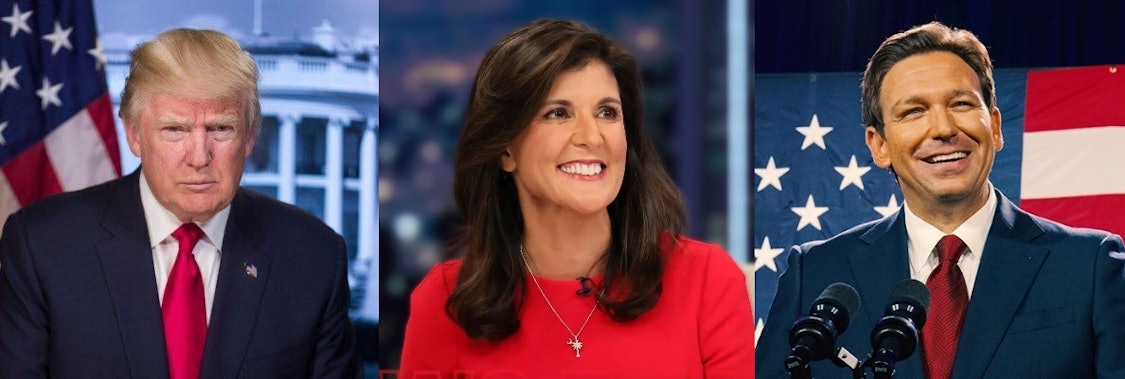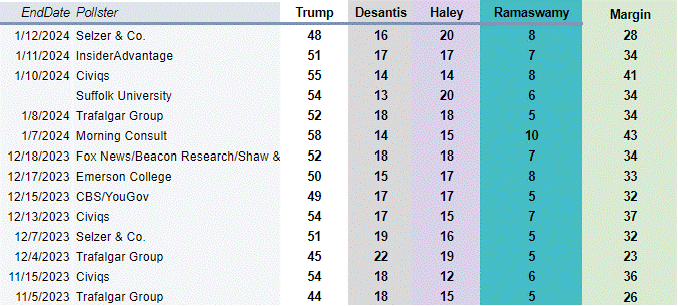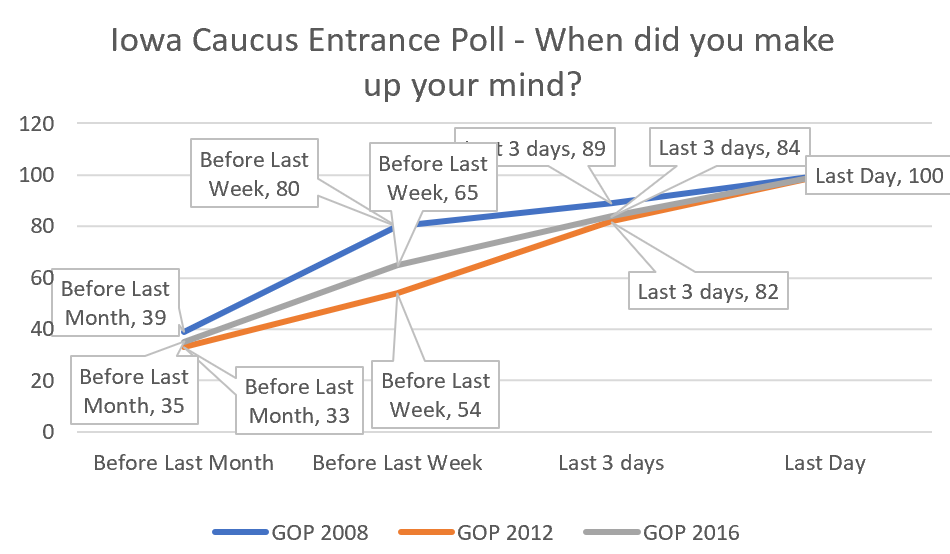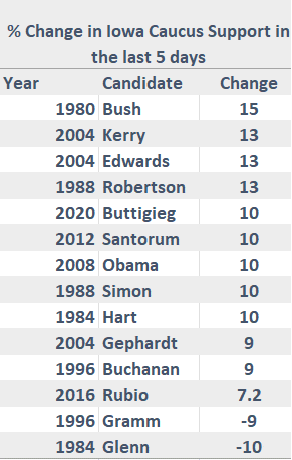
Dan Guild is a lawyer and project manager who lives in New Hampshire. In addition to writing for Bleeding Heartland, he has written for CNN and Sabato’s Crystal Ball, most recently here. He also contributed to the Washington Post’s 2020 primary simulations. Follow him on Twitter @dcg1114.
Ann Selzer released her final pre-caucus Iowa Poll for the Des Moines Register, NBC News, and Mediacom on January 13. Those who closely follow the caucuses know Selzer & Co has been amazingly accurate most of the time. But perhaps the biggest news out of the latest survey is how little news there is in it.
As the table below shows, the last Selzer poll was a little different from other Iowa polls released over the past two months. The stability here is incredible. But given the timidity Trump’s rivals have displayed, maybe that is not surprising.
That said, as I will discuss below, a shocking amount of volatility exists beneath the surface.

This table underscores the failure of Trump’s challengers to lay a glove on him. While DeSantis and Haley debated each other, and their super PACs ran millions of dollars in attacks ads, each driving up the other’s negatives, those with a very favorable rating of the former president increased.
Note the relationship between Iowa GOP caucus-goers with a very favorable impression of Trump and his percentage of supporters in the new Selzer poll.

Commenting on her findings, Ann Selzer cautioned that Haley’s support may be overstated because those who plan to caucus for her are less enthusiastic. But Selzer may be missing something.
Trump’s very unfavorable rating is about 20 percent. As the next table shows, Haley’s strength is disproportionately among independents. Among that group, dislike for Trump may be a powerful motivating factor, making their enthusiasm for their candidate less relevant.

Katie Akin reported for the Des Moines Register on January 14 that 71 percent of the poll respondents “would vote for Trump if November is a Trump-Biden rematch.” In contrast, “Just 23% of Haley supporters say they would vote for Trump in a matchup with Biden. The plurality of Haley supporters, 43%, would vote for Biden instead.”
THE BATTLE FOR SECOND
Given the historical importance of second place in the Iowa caucuses, the only matter to be decided on January 15 is who is the runner-up. And here the data suggest something unusual.
While 82 percent of Trump supporters are certain about their decision, the electorate is more undecided than was the case in the last three competitive GOP caucuses. Selzer found 69 percent of all poll respondents had made up their minds heading into the last few days of the campaign. But as the next chart shows, that number was higher in 2008, 2012, and 2016. Surprisingly, Iowa Republican caucus-goers are less decided than is typical.

Remember, Selzer found 48 percent of likely caucus-goers have a very favorable opinion of Trump. Of the 32 percent of the electorate that has not made up their minds, I estimate only about 15 percent have a very favorable opinion of the front-runner. That means a larger than usual share of the electorate is in play, and those voters have decided not to caucus for Trump.
With so much of the vote uncertain, second choices become more important. Selzer found second place support split almost evenly among the four top candidates. I believe one of Haley, Ramaswamy, or DeSantis will win a disproportionate share of those who have not made up their minds.
It could be any of them, though Ramaswamy’s appeal among those favorable to Trump makes me wonder if he might exceed expectations. Trump put up a negative Truth Social post about Ramaswamy on January 13, suggesting his team may be worried Ramaswamy is cutting into his support.

I posted this table showing late Iowa caucus surges in my last piece. If Haley, DeSantis, or Ramaswamy wins the last 72 hours, we could add to this list.

